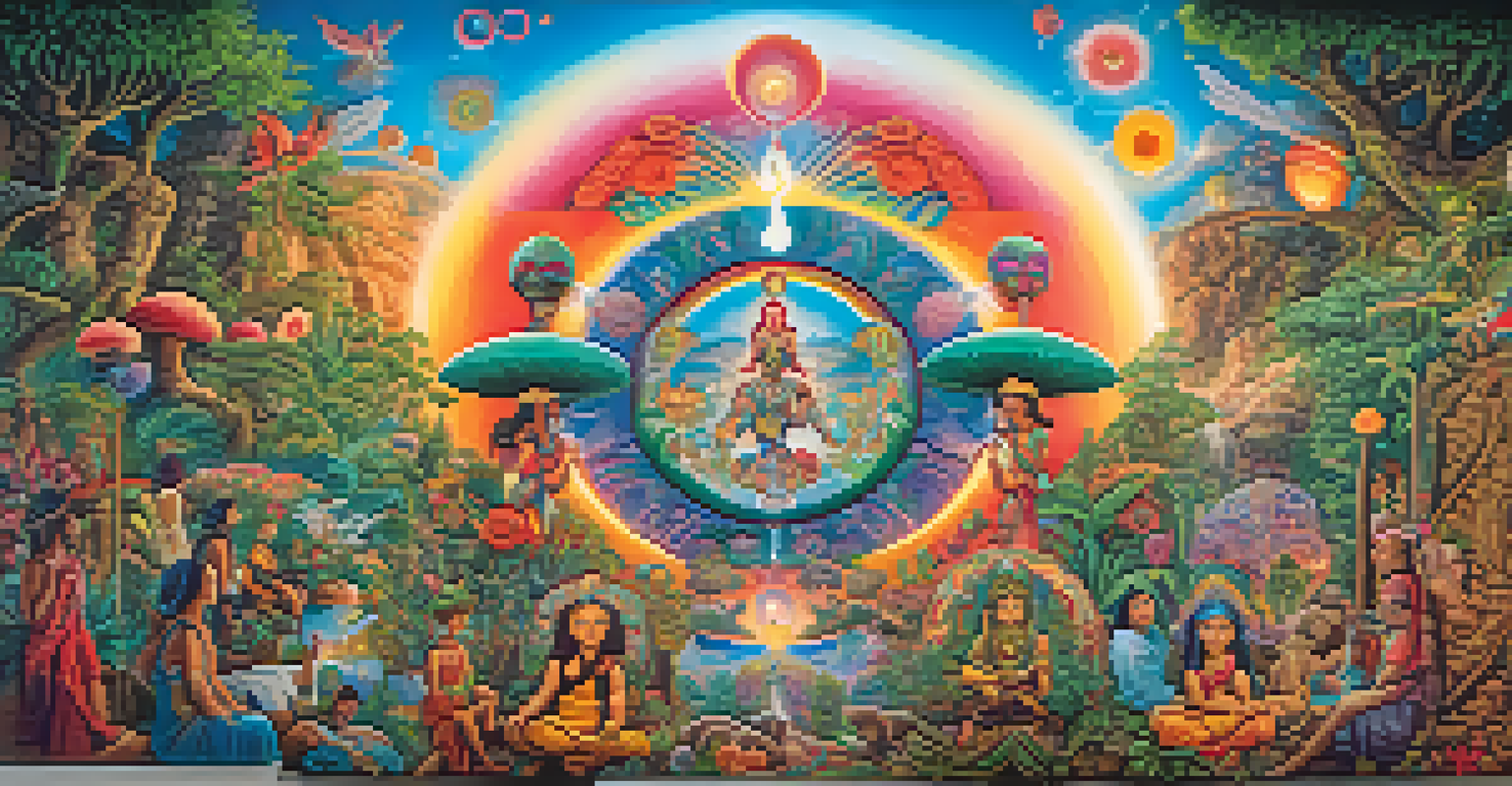Cultural Perspectives on Psychedelics and Consciousness Studies

Understanding Psychedelics: A Cross-Cultural Overview
Psychedelics have been used across various cultures for centuries, often as tools for spiritual exploration and healing. From the ancient rituals of Indigenous tribes in the Amazon to the modern therapeutic settings in Western countries, these substances have a rich history. Each culture brings its own beliefs and practices to the table, shaping how psychedelics are perceived and utilized. This diversity highlights the profound connection between cultural identity and the exploration of consciousness.
The experience of psychedelics is often a deeply personal journey that can lead to profound insights and a greater understanding of oneself and the universe.
In many Indigenous cultures, psychedelics are revered as sacred plants, integral to their spiritual practices. For instance, ayahuasca ceremonies are not merely about the experience; they are deeply embedded in community and ancestral wisdom. These experiences are often seen as journeys into the self and the universe, fostering a sense of interconnectedness. This contrasts sharply with the stigmatized view of psychedelics in some Western contexts, where they are often seen solely as recreational substances.
The way psychedelics are approached can significantly influence their effects on consciousness. In cultures that honor these substances within a ritualistic framework, users often report profound insights and transformative experiences. Conversely, in environments lacking context or guidance, the same substances can lead to confusion and anxiety. This disparity underscores the importance of cultural context in shaping the psychedelic experience.
Psychedelics in Indigenous Spiritual Practices
Indigenous cultures have long recognized the value of psychedelics in spiritual practices, often viewing them as a means to connect with the divine. For example, the use of peyote among Native American tribes serves not only as a sacrament but also as a tool for community bonding and personal reflection. These ceremonies are steeped in tradition, emphasizing respect for the plants and the lessons they impart. They embody a holistic approach to healing that intertwines mind, body, and spirit.

The rituals surrounding these substances often involve music, dance, and communal support, creating an environment conducive to deep introspection. Participants engage in collective experiences that foster unity and shared understanding. This sense of community is crucial, as it provides a safety net during transformative journeys. The shared narratives and cultural stories surrounding these experiences enrich the individual’s understanding of their own consciousness.
Cultural Context Shapes Psychedelics
The effects of psychedelics are profoundly influenced by the cultural and ritualistic contexts in which they are used.
Moreover, Indigenous perspectives on psychedelics highlight the importance of reciprocity with nature. Many cultures believe that these plants possess spirits and should be treated with respect. This relationship underscores a broader worldview that prioritizes sustainability and harmony with the environment, contrasting with more exploitative attitudes seen in some modern contexts. By understanding these practices, we can gain insight into the profound ways psychedelics can be integrated into a meaningful life.
Western Perspectives: Therapeutic vs. Recreational Use
In recent years, there's been a resurgence of interest in psychedelics within Western medicine, particularly for mental health treatment. Research studies are exploring their potential for alleviating conditions like depression, PTSD, and anxiety. This shift has led to a more nuanced understanding of psychedelics, moving away from the stigma of the past. However, the contrast between therapeutic and recreational use remains a topic of debate.
Psychedelics may offer a glimpse into the interconnectedness of all life, challenging our conventional notions of self and reality.
Therapeutic settings often involve structured environments where trained professionals guide the experience. This contrasts sharply with recreational use, where the context can vary widely and is often less controlled. The therapeutic approach emphasizes safety, preparation, and integration, helping users make sense of their experiences. In contrast, recreational settings may lack these supportive measures, potentially leading to negative outcomes.
This dichotomy points to the necessity for education and awareness about responsible psychedelic use. As more people seek out these substances for healing and exploration, a solid framework is essential to ensure safety and efficacy. Balancing the potential benefits of psychedelics with the risks of misuse can create a more informed public dialogue about their place in society.
Cultural Stigma and the Future of Psychedelics
Despite the growing acceptance of psychedelics in some circles, cultural stigma remains a significant barrier. Many people still associate these substances with counterculture movements or illegal activity, which can overshadow their potential benefits. This stigma can discourage individuals from exploring psychedelics for personal growth or healing. Changing these perceptions requires a collective effort to educate the public about the positive aspects of psychedelics.
As research continues to unveil the therapeutic potential of psychedelics, there is hope that perceptions will shift. Campaigns aimed at destigmatizing these substances can play a vital role in changing societal attitudes. By sharing personal stories of healing and transformation, advocates can help humanize the experience and foster a more compassionate understanding. This shift could pave the way for broader acceptance and integration of psychedelics into mainstream health practices.
Therapeutic Use Gaining Acceptance
A resurgence of interest in psychedelics for mental health treatment is challenging previous stigmas and emphasizing their therapeutic potential.
In doing so, we must also respect and honor the cultural contexts from which these substances originate. Acknowledging the wisdom of Indigenous practices can enrich our understanding and use of psychedelics. As we navigate this evolving landscape, fostering a respectful dialogue about cultural perspectives on psychedelics will be essential for creating a more inclusive future.
Psychedelics and Consciousness: A Philosophical Inquiry
The exploration of consciousness through psychedelics raises profound philosophical questions. What does it mean to be conscious, and how can psychedelics expand our understanding of this state? Many users report experiences that challenge conventional notions of self and reality, leading to a reevaluation of their beliefs. These insights can resonate beyond the individual, prompting broader discussions about the nature of existence.
Philosophers have long pondered the relationship between mind, body, and consciousness. Psychedelics can serve as a unique lens through which to explore these concepts, offering altered states of awareness that push the boundaries of traditional thinking. For instance, individuals may experience a sense of unity with the universe or a dissolution of the ego, which can fundamentally alter their worldview. This experiential knowledge can inspire a shift in how we perceive the interconnectedness of all life.
However, engaging with these philosophical questions requires a careful approach. Not everyone may be prepared for the implications of such experiences, and without proper context, they can lead to confusion. As we delve deeper into the relationship between psychedelics and consciousness, fostering discussions that blend science, philosophy, and personal experience will be crucial in navigating these complex ideas.
Modern Research and Cultural Perspectives on Psychedelics
As scientific research into psychedelics gains momentum, it often intersects with cultural perspectives, highlighting the importance of context. Modern studies are beginning to recognize that understanding cultural frameworks can enhance the therapeutic efficacy of these substances. For instance, integrating traditional practices and beliefs into clinical settings can create a more holistic approach to treatment. This synthesis of old and new can lead to richer, more meaningful experiences for users.
Research also reveals that cultural beliefs can influence how individuals experience psychedelics. Those who approach the experience with an understanding of its cultural significance may find deeper insights and healing. This highlights the need for culturally sensitive practices in modern therapy, ensuring that clients feel understood and respected. Bridging the gap between scientific research and cultural understanding can foster a more comprehensive approach to psychedelics.
Integration Requires Education
Responsible integration of psychedelics into society necessitates education and community engagement to foster informed and safe use.
Furthermore, as we continue to explore psychedelics scientifically, it is essential to emphasize ethical considerations. Respecting the cultural origins of these substances while conducting research can prevent exploitation and ensure that Indigenous voices are heard. By valuing these perspectives, we can create a more inclusive and responsible framework for the future of psychedelic research.
Integrating Psychedelics into Contemporary Society
As societal attitudes toward psychedelics evolve, the challenge lies in integrating these substances into contemporary life responsibly. This integration requires a thoughtful approach that considers both the potential benefits and the risks. Education plays a crucial role in this process, providing individuals with the knowledge necessary to make informed choices. By fostering a culture of awareness, we can encourage responsible use and create supportive environments for exploration.
Community engagement is also vital in shaping how psychedelics are perceived and used. Creating safe spaces for discussion, sharing experiences, and learning from one another can help demystify psychedelics. These platforms can promote understanding and reduce stigma, allowing individuals to approach these substances with curiosity rather than fear. Building a supportive community can enhance the collective understanding of psychedelics and their potential.

Ultimately, integrating psychedelics into contemporary society calls for a balanced approach that honors both cultural traditions and modern scientific insights. By blending these perspectives, we can pave the way for a future where psychedelics are seen not just as substances, but as valuable tools for personal growth, healing, and expanded consciousness.